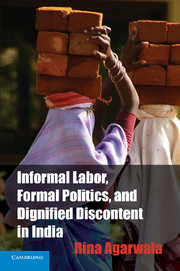Book contents
- Frontmatter
- Contents
- List of Tables
- List of Figures
- Acknowledgments
- Abbreviations
- 1 Introduction
- 2 Struggling with Informality
- 3 The Success of Competitive Populism
- 4 Communism's Resistance to Change
- 5 The Minimal Gains of Accommodation
- 6 Conclusion
- Appendix I Photos of Informal Workers in Construction and Bidi
- Appendix II The Evolution of the Count of Informal Workers
- Appendix III Interview Methodology
- References
- Index
4 - Communism's Resistance to Change
Published online by Cambridge University Press: 05 March 2013
- Frontmatter
- Contents
- List of Tables
- List of Figures
- Acknowledgments
- Abbreviations
- 1 Introduction
- 2 Struggling with Informality
- 3 The Success of Competitive Populism
- 4 Communism's Resistance to Change
- 5 The Minimal Gains of Accommodation
- 6 Conclusion
- Appendix I Photos of Informal Workers in Construction and Bidi
- Appendix II The Evolution of the Count of Informal Workers
- Appendix III Interview Methodology
- References
- Index
Summary
In sharp contrast to the informal workers’ movements in Tamil Nadu analyzed in Chapter 3, those in West Bengal have not succeeded in attaining material benefits from the state. Only one-third of the sixty informal workers interviewed in West Bengal from 2002 to 2004 received any type of material benefit (either work or welfare related) as a result of joining a union (as opposed to thirty of the forty interviewees in Tamil Nadu and more than half of the forty interviewees in Maharashtra). In addition, the type of benefit received in West Bengal differed from those received in Tamil Nadu and Maharashtra. Of the twenty-one interviewees who received a benefit in West Bengal, nearly all received work-based benefits, as opposed to welfare benefits. These benefits were largely confined to members of the politically affiliated construction union. Moreover, the benefits (whether work or welfare related) received by workers in West Bengal were provided by unions, not by the state. Politicians in West Bengal have rarely been directly involved in improving the livelihoods of the state's informal workers. That benefits received in West Bengal were not consistent across organization type or industry and were largely confined to work-based benefits provided by a union indicates that the “new” informal workers’ movement outlined in Chapter 2 was less successful. By 2004, informal workers in West Bengal had failed to create a movement that could withstand the pressures of flexible production structures and simultaneously assure some justice to poor workers.
This finding is surprising given West Bengal's history of revolutionary, class-based politics that, as detailed later, began in the early nineteenth century. From 1977 to 2011, West Bengal was ruled by the Communist Party of India-Marxist (CPM). CPM won consecutive elections based on a promise of guaranteeing benefits for workers. Yet, informal workers have rarely been a CPM priority. Drawing from the state framework outlined in the Introduction, in this chapter I examine the evidence for the “low-success” case of West Bengal, arguing that CPM's unchallenged leadership, its entrenched organizational structure and social base, and its lack of interest in liberalization reforms (until recently) made it difficult for unions in West Bengal to frame informal workers’ demands in terms that appealed to CPM's interest in retaining power.
- Type
- Chapter
- Information
- Publisher: Cambridge University PressPrint publication year: 2013



